Mr. Milo Says TREE OF LIFE is Like 2001
Here are Terrance Malick’s two point in The Tree of Life.
1. God exists because the universe is so complex and beautiful that he must.
2. God torments us because he loves us and is trying to teach us valuable lessons.
The Tree of Life is the most visually beautiful and emotional effective movie I have ever seen. It is a response to and the diametric opposite of my all time favorite film, Stanley Kubrick’s 2001: A Space Odyssey. Both films try to encompass the entirety of the universe and mankind’s place in it. Both have sound tracks composed entirely of classical music (I love the scene where Brad Pitt plays Toccata). 2001 takes place in the future. Tree of Life (TOL) takes place in the past. 2001 is analytical and without emotion. TOL is emotional without analytics. 2001 says that we are insignificant specks in a vast universe. TOL says that the entire history of the universe has been for the purpose of bringing us into existence. Both show us scenes of prehistoric creatures. Both have nearly identical outer space sequences. 2001 is scientific. TOL is spiritual. There’s no accident in these coincidences.
TOL is a story about a mother, father, and three sons in the 1950s. Though this is a small story in a small town, we are constantly reminded that it takes place in a vast and ancient universe. But rather than show this family’s life as an insignificant speck in the cosmos, Malick uses sequences depicting the dawn of the universe and evolution of life to imply that great purpose was necessary to bring us into existence. The Argument from Design has been a central argument in theology for ages, and with all these scenes of creation combined with the films endless spiritual references, I think this is the only conclusion that can be drawn.
Brad Pitt plays a disciplinarian father. His sons despise him for his harshness, but ultimately he is hard on his boys because he loves them, and they understand this. In a different movie as the character of Tyler Durden, Brad Pitt told us, “Our fathers are our models for God.” In this movie we know that Brad Pitt is Terrence Malick’s model for God. In life we suffer. This is because God loves us and must be harsh with us to teach us valuable lessons, just Brad Pitt’s character must with his sons.
We see this parallel again with the film’s repeated references to the Book of Job, in which God inflicts suffering on the pious man Job. Job tells God that he is being made to suffer unjustly. God replies to Job, that he has no idea what it is like to be God and therefore cannot question his judgment. When Brad Pitt apologies to his oldest son for being too hard on them all these years, his son replies, “It’s your house. You can do what you want.” Malick is telling us, we live in God’s house, and he can do whatever he wants.
Kubrick’s 2001 gives us a triumphantly scientific future. With TOL I think Malick shows us an utter contempt for science. As thoroughly as a Malick traces the history of the universe from gas clouds to solar systems to single cells organisms to dinosaurs, he conveniently leaves out the technological age, which is exactly where 2001 begins, with the dawning of mankind’s use of tools. In fact the only reference Malick makes to science in this film is in Brad Pitt’s character’s repeated failure to capitalize on his scientific patents. Pitt’s character’s only interest in science is as means of satisfying a greed for money. His true love is music, but he abandons a career as a musician in hopes of becoming rich through inventing and engineering. A hope that never materializes. In showing us a failed scientist is Malick trying to tell us that science is a failure? Or is he bashing the purely scientific explanation for everything presented in 2001?
Malick uses the Tree as his central motif and spiritual symbol in this film. We see children climbing trees, swinging from them, and playing around them. There’s hardly a scene in this movie that doesn’t have a tree in it. They are on every street corner and outside every window. 2001 takes its theme music and it general themes from Nietzsche’s “Thus Spake Zarathustra,” in which Nietzsche makes the very relevant observation about the Tree of Knowledge of Good and Evil. We love the tree as a spiritual symbol because trees grow constantly upward towards the light and towards God, but we forget what’s happening beneath the surface, as a tree cannot grow higher towards the light without digging its roots deeper into darkness. As such I think Malick sees only the light.
The differences between TOL and 2001 are of perspective. Do you see the tree or the tree and its roots? Though both films are abstract, I think most people will prefer TOL because it is more emotional accessible. Tree of Life is a great movie, but I still prefer 2001.
The acting performances in the film are excellent all around, particularly Pitt’s performance as the dad. Jessica Chastain plays a sweet and loving mother who is incapable of standing up to her husband or her sons. She’s also the only major
female character in an almost entirely male cast. Sean Penn is listed as a staring character in the film, but he’s actually barely in it. He plays the adult version of Pitt’s middle son. We see a few brief glimpses of him in the present to show he’s become very successful in the corporate world, just as his father would have wanted. I don’t blame the marketing department for making Penn’s part appear bigger than it is. This is a hard film to market. It’s a touching small town family drama, and it has CGI dinosaurs.
[Photos: Fox Searchlight]


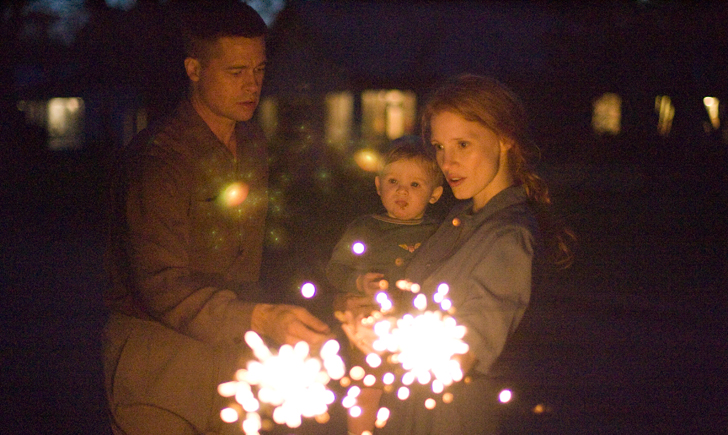
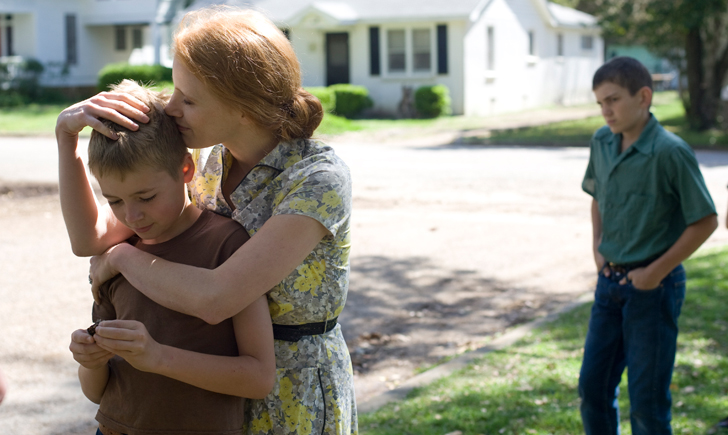
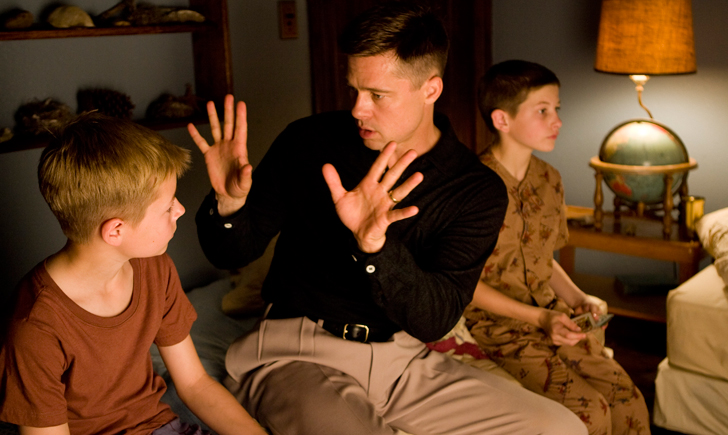

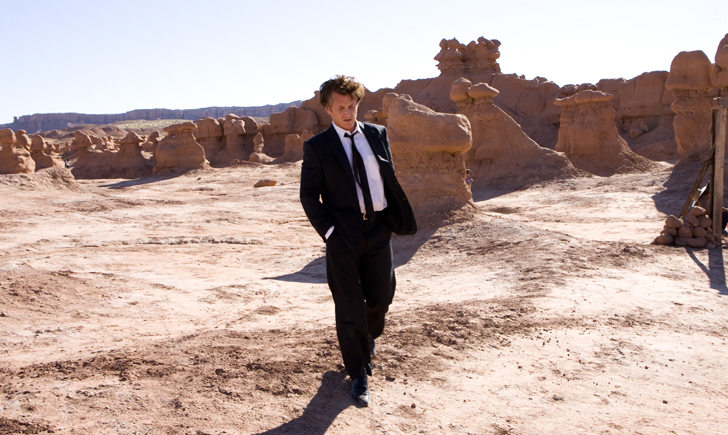

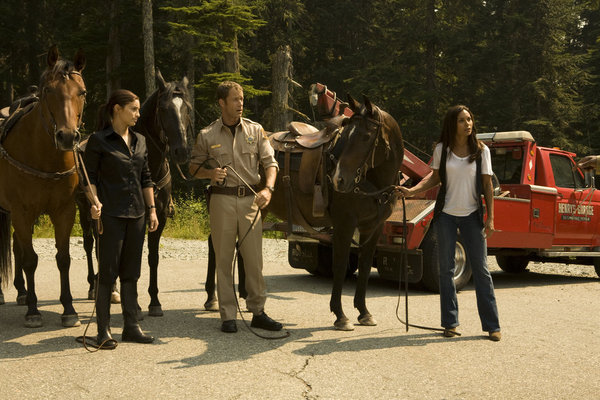
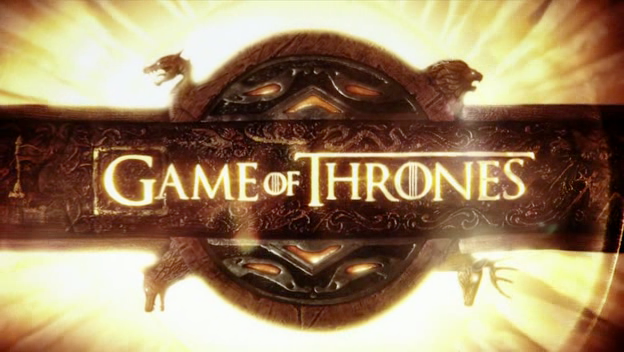
I have hesitated seeing this in the theater, because Malick’s movies make me cry like a baby, he is a true artist. But I may just have to take some tissues with me and go now.